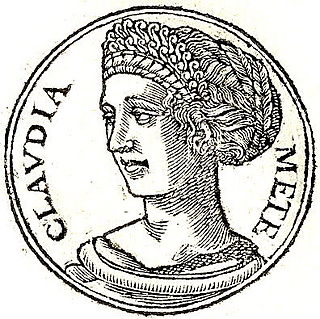
Marcus Junius Brutus, often referred to as Brutus, was a politician of the late Roman Republic. After being adopted by his uncle he used the name Quintus Servilius Caepio Brutus, but eventually returned to using his original name. He took a leading role in the assassination of Julius Caesar.

Gaius Cassius Longinus, often referred to as Cassius, was a Roman senator and general best known as a leading instigator of the plot to assassinate Julius Caesar. He was also the brother-in-law of Marcus Junius Brutus, also a leader of the conspiracy. He commanded troops with Brutus during the Battle of Philippi against the combined forces of Mark Antony and Octavian, Caesar's former supporters, and committed suicide after being defeated by Mark Antony.

The gens Livia was an illustrious plebeian family at ancient Rome. The first of the Livii to obtain the consulship was Marcus Livius Denter in 302 BC, and from his time the Livii supplied the Republic with eight consuls, two censors, a dictator, and a master of the horse. Members of the gens were honoured with three triumphs. In the reign of Augustus, Livia Drusilla was Roman empress, and her son was the emperor Tiberius.

Clodia, nicknamed Quadrantaria, and occasionally referred to in scholarship as Clodia Metelli, was one of three known daughters of the ancient Roman patrician Appius Claudius Pulcher and either Caecilia Metella Balearica, or her cousin, Caecilia Metella daughter of Lucius Caecilius Metellus Diadematus.

Lucius Livius Andronicus was a Greco-Roman dramatist and epic poet of the Old Latin period. He began as an educator in the service of a noble family at Rome by translating Greek works into Latin, including Homer's Odyssey. They were meant at first as educational devices in the school he founded. He wrote works for the stage—both tragedies and comedies—which are regarded as the first dramatic works written in the Latin language of ancient Rome. His comedies were based on Greek New Comedy and featured characters in Greek costume. Thus, the Romans referred to this new genre by the term comoedia palliata. The Roman biographer Suetonius later coined the term "half-Greek" of Livius and Ennius. The genre was imitated by the next dramatists to follow in Andronicus' footsteps and on that account he is regarded as the father of Roman drama and of Latin literature in general; that is, he was the first man of letters to write in Latin. Varro, Cicero, and Horace, all men of letters during the subsequent Classical Latin period, considered Livius Andronicus to have been the originator of Latin literature. He is the earliest Roman poet whose name is known.
The gens Tullia was a family at ancient Rome, with both patrician and plebeian branches. The first of this gens to obtain the consulship was Manius Tullius Longus in 500 BC, but the most illustrious of the family was Marcus Tullius Cicero, the statesman, orator, and scholar of the first century BC. The earliest of the Tullii who appear in history were patrician, but all of the Tullii mentioned in later times were plebeian, and some of them were descended from freedmen. The English form Tully, often found in older works, especially in reference to Cicero, is now considered antiquated.
Elephantis was a Greek poet and physician apparently renowned in the classical world as the author of a notorious sex manual. Due to the popularity of courtesans taking animal names in classical times, it is likely Elephantis is two or more persons of the same name. None of her works have survived, though they are referenced in other ancient texts.
Lucius Cornelius Sisenna was a Roman soldier, historian, and annalist.
Publius Nigidius Figulus was a scholar of the Late Roman Republic and one of the praetors for 58 BC. He was a friend of Cicero, to whom he gave his support at the time of the Catilinarian conspiracy. Nigidius sided with the Optimates in the civil war between Julius Caesar and Pompeius Magnus.
Appius Claudius Pulcher was a consul of the Roman Republic in 54 BC. He was an expert in Roman law and antiquities, especially the esoteric lore of the augural college of which he was a controversial member. He was head of the senior line of the most powerful family of the patrician Claudii. The Claudii were one of the five leading families which had dominated Roman social and political life from the earliest years of the republic. He is best known as the recipient of 13 of the extant letters in Cicero's ad Familiares corpus, which date from winter 53-52 to summer 50 BC. Regrettably they do not include any of Appius' replies to Cicero as extant texts of any sort by members of Rome's ruling aristocracy are quite rare, apart from those of Julius Caesar.
Gaius Claudius Marcellus (Maior) was a Consul of the Roman Republic in 49 BCE. He is known to historians as C. Claudius Marcellus Major to distinguish him from his homonymous cousin, Gaius Claudius Marcellus Minor, one of the Consuls of the previous year.

In ancient Roman law, ambitus was a crime of political corruption, mainly a candidate's attempt to influence the outcome of an election through bribery or other forms of soft power. The Latin word ambitus is the origin of the English word "ambition," which is another of its original meanings; ambitus was the process of "going around and commending oneself or one's protégés to the people," an activity liable to unethical excesses. In practice, bringing a charge of ambitus against a public figure became a favored tactic for undermining a political opponent.

The Saepta Julia was a building in the Campus Martius of Rome, where citizens gathered to cast votes. The building was conceived by Julius Caesar and dedicated by Marcus Vipsanius Agrippa in 26 BCE. The building replaced an older structure, called the Ovile, built as a place for the comitia tributa to gather to cast votes. The Saepta Julia can be seen on the Forma Urbis Romae, a map of the city of Rome as it existed in the early 3rd century CE. Part of the original wall of the Saepta Julia can still be seen right next to the Pantheon.
The Lex Scantinia is a poorly documented ancient Roman law that penalized a sex crime (stuprum) against a freeborn male minor. The law may also have been used to prosecute adult male citizens who willingly took a passive role in having sex with other men. It was thus aimed at protecting the citizen's body from sexual abuse (stuprum), but did not prohibit homosexual behavior as such, as long as the passive partner was not a citizen in good standing. The primary use of the Lex Scantinia seems to have been harassing political opponents whose lifestyles opened them to criticism as passive homosexuals or pederasts in the Hellenistic manner.
Castor of Rhodes, also known as Castor of Massalia or Castor of Galatia according to Suidas, was a Greek grammarian and rhetorician. He was surnamed Philoromaeus and is usually believed to have lived about the time of Cicero and Julius Caesar.

The gens Antistia, sometimes written Antestia on coins, was a plebeian family at Rome. The first of the gens to achieve prominence was Sextus Antistius, tribune of the plebs in 422 BC. The gens gained patrician status under Augustus.
Gaius Calvisius Sabinus was a consul of the Roman Republic in 39 BC under the Second Triumvirate. He and his consular colleague Lucius Marcius Censorinus had been the only two senators who tried to defend Julius Caesar when his assassins struck on 15 March 44 BC, and their consulship under the triumvirate is taken as a recognition of their loyalty. An inscription, described by Ronald Syme as "one of the most remarkable inscriptions ever set up in honour of a Roman senator," praises Calvisius for pietas, his sense of duty or devotion. As a military officer, Calvisius is notable for his long service and competence, though he was not without serious defeats.

The gens Axia, also spelled Axsia, was a plebeian family at Rome during the final century of the Republic and the beginning of the Empire. The gens does not appear to have been particularly large or important, although at least some of the family were reasonably wealthy.
The early career of Julius Caesar was characterized by military adventurism and political persecution. Julius Caesar was born on July 13, 100 BC, into a patrician family, the gens Julia, which claimed descent from Iulus, son of the legendary Trojan prince Aeneas, supposedly the son of the goddess Venus. His father died when he was just 16, leaving Caesar as the head of the household. His family status put him at odds with the Dictator Lucius Cornelius Sulla, who almost had him executed.

The gens Fonteia was a plebeian family at Rome. Members of this gens are first mentioned toward the end of the third century BC; Titus Fonteius was a legate of Publius Cornelius Scipio during the Second Punic War. The first of the Fonteii to obtain the consulship was Gaius Fonteius Capito, consul suffectus in 33 BC.











